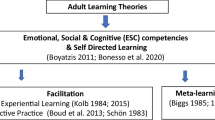Abstract
This chapter promotes the effective evaluation of leadership learning and development interventions. An evaluation is the ‘systematic collection of information about the activities, characteristics, and outcomes of programs in order to make judgements about the program, to improve program effectiveness, and/or to inform decisions about future programming’ (Patton, 1997, p. 23). It is a fundamental step in the learning and development process. Evaluation should not be confused with assessment, which typically involves the measurement of how an individual learner performed on a learning task. In contrast, evaluation aims to improve (formative) or prove the worth and efficacy (summative) of programmes (Scriven, 1991). Many commentators have celebrated the importance of evaluation describing is as the ‘backbone of the learning and change process’ (Pym, 1968) since it ‘provides information for action’ (Weiss, 1972, p. 318). Companies, professional management associations, business schools and consultants assume that leadership development interventions will result in improved leadership (Collins and Holton, 2004, p. 218). However, on the whole organisations do not properly evaluate the impact of leadership learning and development — they fail to budget for it financially, make time available for a proper evaluation or employ the most effective evaluation practices.
Access this chapter
Tax calculation will be finalised at checkout
Purchases are for personal use only
Preview
Unable to display preview. Download preview PDF.
Similar content being viewed by others
References
G. Alliger and E. Janak, ‘Kirkpatrick’s levels of training criteria: Thirty years later’, Personnel Psychology, 42 (1989) 331–342.
G.M. Alliger, S.I. Tannenbaum, W. Bennett, H. Traver and A. Shotland, ‘A meta-analysis of the relations among training criteria’, Personnel Psychology, 50 (1997) 341–360.
J.G. Burgoyne, W. Hirsh and S. Williams, The Development of Management and Leadership Capability and its Contribution to Performance: The Evidence, the Prospects and the Research Need (London: DfES, DfES Research Report 560. Online at [http://www.dfes.gov.uk/research/data/uploadfiles/RR560.pdf], 2004).
J.G. Burgoyne and R. Singh, ‘Evaluation of training and education’, Journal of European Industrial Training, 1 (1977) 17–21.
D. Collins and E. Holton, ‘The effectiveness of managerial leadership development programs: A meta-analysis of studies from 1982–2001’, Human Resource Development Quarterly, 15 (2004) 217–225.
J. Conger and B. Benjamin, Building Leaders: How Successful Companies Develop the Next Generation (San Francisco, CA: Jossey-Bass, 1999).
S.B. Craig and K. Hannum, ‘Chapter 1 experimental and quasi-experimental evaluations’, in K.M. Hannum, J.W. Martineau and C. Reinelt (eds), The Handbook of Leadership Development Evaluation (Jossey-Bass & Centre for Creative Leadership, 2006).
L.J. Cronbach, ‘Course improvement through evaluation’, Teachers College Record, 64 (1963) 672–683.
D. Denyer, D. Tranfield and J. Ernst van Aken, ‘Developing design propositions through research syntheses’, Organization Studies, 29 (2008) 393–413.
M. Easterby-Smith, Evaluation of Management Education, Training and Development (Aldershot: Gower, 1986).
I.L. Goldstein, ‘Training in work organizations’, Annual Review of Psychology, 31 (1980) 229–272.
A. Hamblin, The Evaluation and Control of Training (London: McGraw Hill, 1974).
P.G.M. Hesseling, Strategy of Evaluation Research in the Field of Supervisory and Management Training (Amsterdam: Van Gorcum, 1966).
E.F. Holton III, ‘The flawed four-level evaluation model’, Human Resource Development Quarterly, 7 (1996) 5–21.
R. Kaufman and J. Keller, ‘Levels of evaluation: Beyond Kirkpatrick’, Human Resources Quarterly, 5 (1994) 371–380.
R. Kaufman, J. Keller and R. Watkins, ‘What works and what doesn’t: Evaluation beyond Kirkpatrick’, Performance and Instruction, 35 (1996) 8–12.
D.L. Kirkpatrick, ‘Techniques for evaluating training programs’, Journal of the American Society for Training and Development, 13 (1959) 3–32.
D.L. Kirkpatrick, ‘Evaluation’, in R.L. Craig (ed.), Training and Development Handbook (New York: McGraw-Hill, 1976) 301–319.
D. Kirkpatrick, Evaluating Training Programs: The Four Levels (San Francisco: Berrett-Koehler, 1998).
M.Q. Patton, Utilization-Focused Evaluation: The New Century Text (London: Sage, 1997).
R. Pawson, ‘Evidence-based policy: The promise of realist synthesis’, Evaluation, 8 (2002) 340–358.
R. Pawson and N. Tilley, ‘What works in evaluation research?’, British Journal of Criminology, 34 (1994) 291–306.
R. Pawson and N. Tilley, Realistic Evaluation (London: Sage, 1997).
J.J. Phillips, Return on Investment in Training and Performance Programs (Houston: Gulf Publishing, 1997).
D.L.A. Pym, ‘Organisation evaluation and management training’, Journal of Management Studies, 5 (1968) 167–183.
Research and Markets, ‘Training market report 2003’, Online at http://www.researchandmarkets.com/reports/39647/39647.htm, accessed 15 January 2008 (2004).
M. Scriven, Evaluation Thesaurus (London: Sage, 1991).
N.L. Smith, ‘Evaluating evaluation methods’, Studies in Educational Evaluation, 7 (1981) 173–181.
D.L. Stufflebeam, ‘The CIPP model for program evaluation’, in G.F. Madaus, M.S. Striven and D.L. Stufflebeam (eds), Evaluation Models (Boston: Kluwer-Nijhoff, 1989).
R.A. Swanson and E.F. Holton, Results: How to Assess Performance, Learning, and Perceptions in Organizations (San Francisco: Berrett-Koehler, 1999).
S.I. Tannenbaum and S.B. Woods, ‘Determining a strategy for evaluating training: Operating within organizational constraints’, Human Resource Planning, 15 (1992) 63–81.
I. Thomson, ‘Evaluating the power and impact of training’, in CIPD, Reflections: New Trends in Learning, Training and Development (2004) Download from www.cipd.co.uk/surveys
P.B. Warr, M.W. Bird and N. Rackham, Evaluation of Management Training. (Aldershot: Gower, 1970).
C.H. Weiss, Evaluating Action Programs: Readings in Social Action and Education (Boston: Allyn & Bacon, 1972).
C.H. Weiss, ‘Where politics and evaluation research meet’, Evaluation, 1 (1973) 37–45.
C.H. Weiss, ‘Politics and evaluation: A reprise with mellower overtones’, Evaluation Practice, 14 (1993) 107–109.
Editor information
Editors and Affiliations
Copyright information
© 2008 James Collins and David Denyer
About this chapter
Cite this chapter
Collins, J., Denyer, D. (2008). Leadership Learning and Development: A Framework for Evaluation. In: James, K.T., Collins, J. (eds) Leadership Learning. Palgrave Macmillan, London. https://doi.org/10.1057/9780230584075_10
Download citation
DOI: https://doi.org/10.1057/9780230584075_10
Publisher Name: Palgrave Macmillan, London
Print ISBN: 978-1-349-35432-0
Online ISBN: 978-0-230-58407-5
eBook Packages: Palgrave Business & Management CollectionBusiness and Management (R0)




